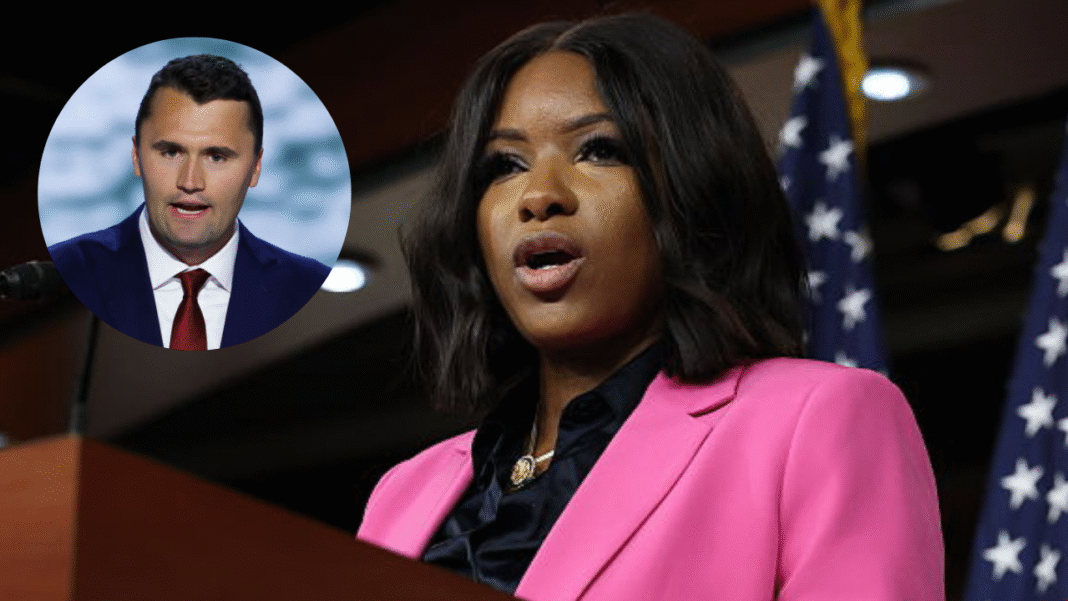The Clash of Perspectives: Charlie Kirk vs. Rep. Jasmine Crockett
In recent discussions surrounding race and political representation in the United States, a dramatic exchange unfolded between conservative activist Charlie Kirk and Congresswoman Jasmine Crockett, D-Texas, just a month before Kirk’s tragic shooting death. This exchange highlights the deep divide in American political discourse, particularly concerning issues of race and the so-called “Great Replacement Theory.”
A Controversial Theory
Kirk, known for his provocative stances, made headlines when he accused Crockett and the Democratic Party of orchestrating a “sinister” plan to replace white Americans with people of color. This claim echoes the “Great Replacement Theory,” a conspiracy theory suggesting that a deliberate effort is underway to diminish the white population in America. Such rhetoric has been criticized for fueling racism and xenophobia.
During his podcast on August 4, Kirk stated, “The great replacement of white people is far more sinister than any redistricting project,” as the topic of congressional map changes drew attention. This perspective attempts to frame demographic changes as a threat to the existing social order, igniting fears and animosities that have far-reaching implications.
Crockett’s Response
When confronted with Kirk’s assertions, Congresswoman Crockett firmly rejected the idea that she, or any Democrat, is complicit in efforts to replace white Americans. Responding to Kirk’s inflammatory comments in an interview with ABC News Live, she labeled the “Great Replacement Theory” as “unfounded” and a manifestation of white supremacy. “That is, unfortunately, the cancer known as white supremacy,” she stated, highlighting the dangerous narratives that can emerge from such extremist beliefs.
Crockett noted that she was not even aware of Kirk’s attacks on her until after his death. “I wouldn’t say I followed him,” she remarked, adding that many of her friends, who knew little about Kirk, were taken aback when they found out he had mentioned her.
The Bigger Picture: Redistricting and Representation
The discourse surrounding redistricting has been particularly heated in Texas, where efforts are underway to redraw congressional maps in ways that many believe disproportionately benefit Republicans ahead of the 2026 midterm elections. As Crockett pointed out, the fight for fair representation should focus on honoring constitutional rights and ensuring that every voice is heard.
Her commitment to collective representation was clear when she remarked, “It is not about any individual; it is about the collective. It is about the people.” This sentiment underscores how essential it is for politicians to transcend personal rivalries and focus on broader democratic principles.
The Dangers of Racial Narratives
Kirk’s attacks on Crockett did not go unnoticed. He not only disparaged her political acumen but also made personal remarks that echo a larger trend of targeting politicians based on race and gender. His statements included admonitions to young men against marrying women like Crockett, characterizing her in derogatory terms.
This kind of targeted discourse exemplifies how political figures can exploit racial and gender stereotypes to galvanize their bases. Such rhetoric contributes to a toxic political environment where fear and animosity towards various demographics are tolerated, if not encouraged.
A Call for Honest Conversations
Crockett’s insistence on having honest conversations about race and its effects on American society is vital in today’s polarized climate. She pointed out that ignoring the realities of white supremacy only exacerbates the issues at hand, referencing mass shootings linked to white nationalist ideologies as evidence of a serious societal problem.
“White supremacy is a real issue,” she asserted, challenging anyone who dismisses it as a mere echo of far-right conspiracy theories.
The Role of Political Discourse
As representatives like Crockett navigate these complex issues, the importance of responsible and empathetic political discourse cannot be overstressed. Conversations around race and representation should not devolve into name-calling and demonization but rather become opportunities for engagement and understanding.
This clash between Kirk and Crockett not only illuminates the fracture within American politics but serves as a reminder of the complexities and nuances involved in discussions of race, representation, and the very fabric of society itself.
The Broader Implications
The tensions brought to the forefront by figures like Kirk and Crockett reveal the broader implications regarding how race and representation are understood and debated in contemporary America. A future grounded in justice and equality relies on the ability of policymakers and citizens alike to grapple with these challenging dialogues collectively and constructively.



